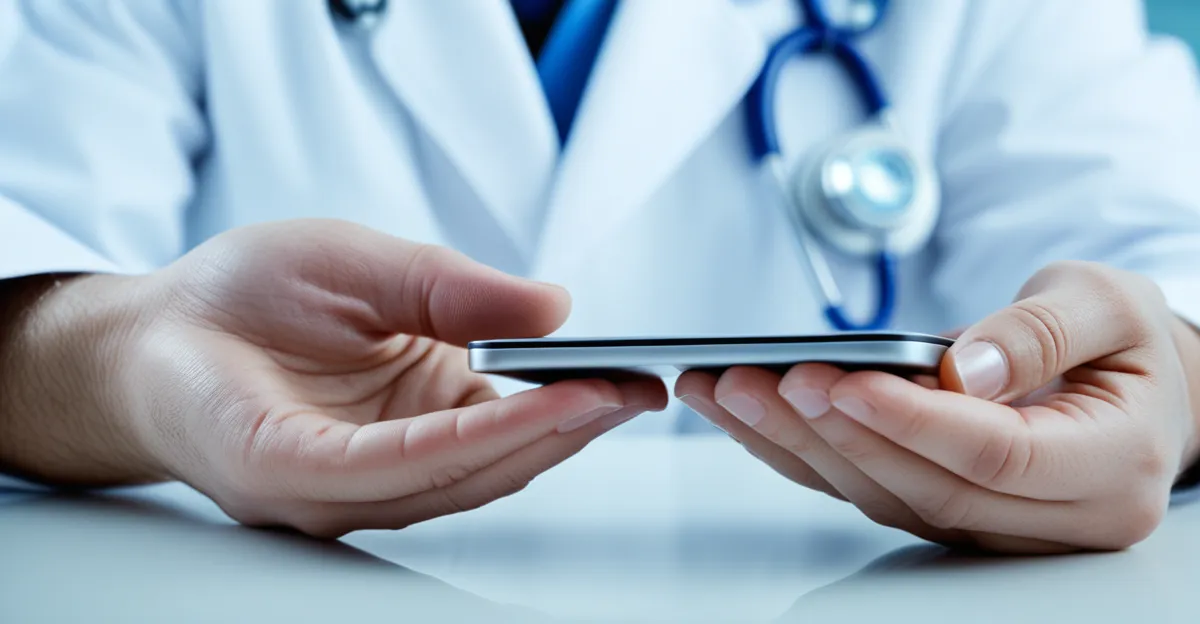Overview of Technology Trends in UK Healthcare
In the ever-evolving landscape of UK healthcare technology trends, staying abreast of the latest advancements is crucial. The current digital age offers a wealth of opportunities to revolutionize patient care and operational efficiency. One significant transformation is the impact of technology on healthcare services delivery. From telemedicine to artificial intelligence, each development bears promising potential to redefine traditional practices.
Integrating these technological advancements demands attention to key areas that significantly benefit from innovation. These include enhancing patient outcomes through data-driven approaches, such as predictive analytics, and improving diagnostic accuracy with AI. Furthermore, the proliferation of wearable technology and remote patient monitoring is driving increased patient engagement and empowering individuals to manage their own health conditions.
In parallel : What Impact Does UK Technology Have on E-commerce Growth?
Staying updated with emerging trends becomes vital as they not only shape the future of patient care but also influence the role of healthcare professionals in their ability to adapt and effectively use these new tools. It ensures that the UK healthcare system remains resilient and capable of meeting the growing demands of an informed public. As experts continue to explore these transformative avenues, they focus on sustainable practices and ethical considerations, ensuring that technological integration serves the best interests of both patients and healthcare providers alike.
Telemedicine’s Rise and Evolution
As the digital era reshapes healthcare, telemedicine has emerged as a pivotal transformation. This virtual healthcare approach enables medical professionals to diagnose, treat, and monitor patients remotely, enhancing accessibility and convenience. Remote patient monitoring plays a crucial role, especially in managing chronic conditions and post-operative care. This innovation provides patients with timely healthcare access and reduces the strain on physical healthcare infrastructure.
Have you seen this : What are the opportunities for tech talent in the UK?
Definition and significance of telemedicine
Telemedicine encompasses a range of services such as consultations, diagnostics, and treatment, all facilitated through digital platforms. It significantly decreases the need for in-person visits, especially beneficial in remote areas or during health crises. This not only saves time and resources but broadens healthcare reach.
Statistics on telemedicine usage during recent events
Recent global events have catalysed a surge in telemedicine adoption. Statistics indicate a skyrocketing increase in virtual consultations, with some regions experiencing up to a 175% rise compared to pre-pandemic levels. This shift highlights the demand for adaptable healthcare solutions.
Case studies showcasing successful telemedicine implementations
Numerous case studies illustrate the success of telemedicine implementations. For instance, remote practices in primary care settings led to improved patient satisfaction and compliance. These examples showcase how healthcare providers are overcoming geographical and logistical barriers to deliver care efficiently.
Overall, telemedicine and remote patient monitoring are revolutionizing how healthcare is delivered, ensuring that services are more accessible, efficient, and tailored to individual patient needs. However, challenges such as data privacy and technological accessibility need ongoing attention to sustain this evolution.
The Role of Artificial Intelligence in Healthcare Transformation
The integration of AI in healthcare is transforming how medical services are delivered, offering significant advancements in diagnostic accuracy and overall patient outcomes. AI’s ability to process and analyze vast amounts of data rapidly makes it a powerful tool for identifying medical anomalies and predicting patient conditions with unprecedented precision.
Overview of AI Applications in Healthcare
Artificial intelligence is employed in numerous healthcare applications, ranging from imaging diagnostics to personalized medicine. For instance, machine learning algorithms can swiftly analyze radiological images, aiding in the early detection of conditions like tumors. Additionally, AI assists in developing treatment plans tailored to individual patient genetic profiles, optimizing therapeutic outcomes and reducing treatment times.
Enhancing Diagnostic Accuracy and Patient Outcomes
AI-powered systems have demonstrated remarkable proficiency in improving diagnostic accuracy. For example, AI algorithms analyzing mammograms outperform human radiologists by reducing false positives and identifying subtle patterns undetectable by the human eye. Such precision leads to earlier interventions, significantly improving patient prognoses and healthcare efficiency.
Future Implications of AI in Healthcare Decision Making
The future of AI technology in healthcare presents exciting prospects for enhanced decision-making processes. AI systems can offer real-time data analytics, providing clinicians with actionable insights for evidence-based decisions. Furthermore, as AI technology continues to evolve, its adoption will undeniably foster a more proactive approach in patient care management, ultimately enhancing healthcare delivery systems globally.
Data Analytics and Its Impact on Healthcare Services
In the evolving realm of UK healthcare, data analytics has become a cornerstone for enhancing service delivery and patient outcomes. This involves leveraging vast amounts of healthcare data to inform decision-making, improve efficiency, and foster data-driven strategies.
Importance of Data-Driven Decision Making in Healthcare
Incorporating data-driven decision-making in healthcare is crucial for informed clinical and operational choices. Through predictive analytics, healthcare providers can anticipate patient needs, highlighting potential risks before they manifest, thereby optimizing patient management strategies.
Recent Statistics Illustrating the Effectiveness of Data Analytics
Statistics underscore the effectiveness of healthcare data analytics in improving systemic performance. For instance, hospitals utilizing big data analytics witnessed a marked reduction in unforeseen complications, demonstrating the value of comprehensive data examination.
Innovations in Predictive Analytics for Patient Care
Innovations in predictive analytics are revolutionizing patient care by refining diagnosis and treatment protocols. These technologies analyze patient histories and current health data to predict illness trajectories, personalizing treatment plans for enhanced results.
Benefits of data analytics in healthcare include:
- Enhanced operational efficiency through resource optimization.
- Improved patient outcomes via personalized care.
- Proactive risk management through ongoing data monitoring.
By harnessing healthcare data insights, providers can significantly boost operational performance, reduce costs, and chiefly improve patient care quality.
Wearable Technology and Remote Health Monitoring
In recent years, there has been considerable growth in wearable technology within the healthcare market, marking a significant shift towards proactive health management. These devices, such as smartwatches and fitness trackers, have revolutionized health monitoring by providing real-time data and insights into an individual’s wellbeing.
Wearable technology plays a transformative role in patient monitoring and chronic disease management. Devices measure vital signs like heart rate, sleep patterns, and activity levels, offering immediate feedback to both users and healthcare professionals. This helps in not only tracking health metrics but also in early detection of potential health issues, potentially reducing the need for frequent in-person consultations.
A key benefit of these technologies is the heightened engagement and empowerment of patients. By having continual access to their health data, patients become active participants in managing their health conditions. For instance, individuals with diabetes can use continuous glucose monitors to regulate their blood sugar levels more effectively, while chronic heart disease patients benefit from monitors that track symptoms and suggest timely interventions.
Moreover, the future development of health monitoring devices aims to integrate advanced data analytics for personalized health recommendations, enhancing overall patient engagement. As these technologies evolve, they hold the potential to not only improve individual health outcomes but also to support more efficient healthcare systems on a broader scale.
Future Developments in Healthcare Technology
The landscape of healthcare technology in the UK is on the cusp of revolutionary changes, driven by relentless innovation and a focus on patient-centered care. The pace of advancements in health technology promises to transform how services are delivered and experienced. As we look ahead, future tech in healthcare carries the potential to redefine patient engagement, treatment protocols, and overall healthcare delivery.
Predictions for Upcoming Healthcare Technology Trends
Several innovations in healthcare are expected to gain momentum, with personalized medicine and genomics at the forefront. The use of gene-editing technologies, such as CRISPR, could drastically alter how genetic disorders are managed. Additionally, advancements in 3D printing technology may facilitate the creation of personalized prosthetics and even organ printing, revolutionizing transplantation procedures.
Potential Challenges of Integrating New Technologies
Integrating future technologies into the existing UK healthcare framework brings significant challenges. Notably, ensuring data security and patient privacy as digital records become the norm. Innovation in healthcare sometimes clashes with infrastructure limitations, necessitating robust policy frameworks to support seamless integration. Interoperability between legacy systems and new technologies also requires attention to harness the full potential of advancements in health technology.
Expert Opinions on the Future Landscape of UK Healthcare Technology
Experts underscore the importance of sustainability and ethical considerations in tech adoption. They argue for a balanced approach where healthcare professionals are equipped with the necessary skills to leverage technology effectively. The future beckons for an evolved role for practitioners, one where technological proficiency complements clinical expertise. Innovation in this sector is not just about cutting-edge equipment but also about educating and preparing the workforce for a digitally enhanced healthcare environment.








